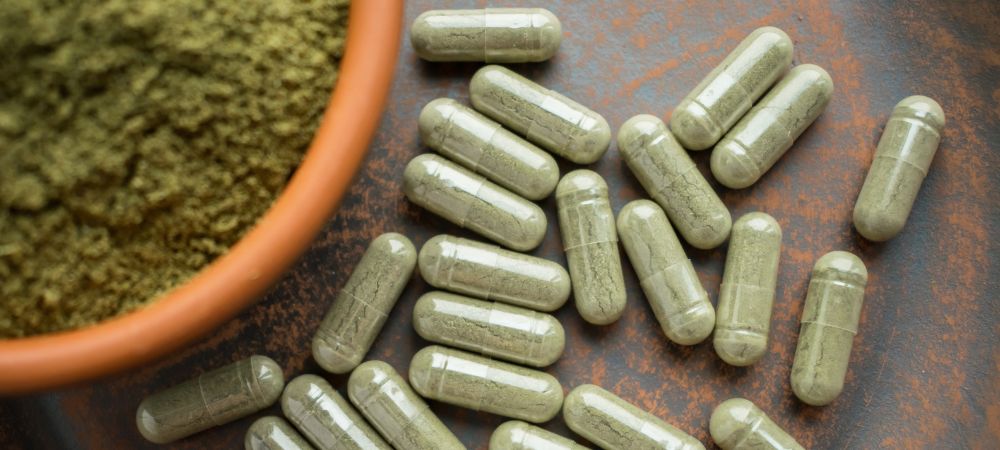Kratom is a potent substance for sale as a “natural” dietary supplement throughout the United States. While retailers may stock their shelves with these products and advertise them as “safe,” the effects of Kratom can be hazardous.
This article will explore Kratom abuse. You will learn:
- What Kratom is
- The effects and risks of using Kratom
- How long Kratom remains in your system during withdrawal
- How long drug screening tests may detect Kratom
- Where to find substance abuse treatment and support
If you or someone you care about uses Kratom or needs treatment for substance use disorder (SUD), help is available at The Living Room. Contact our compassionate specialists now to explore our holistic treatment and support programs or to schedule an intake assessment.
What is Kratom?
Kratom is a substance that comes from a Southeast Asian plant called Mitragyna speciosa.[1] Manufacturers create products from this plant and sell them in smoke shops, gas stations, and other retailers.
Kratom affects the brain similarly to opioids. It binds to opioid receptors and produces effects that include:
- Decreased sensation of pain
- Euphoria (intense pleasure)
- Increased alertness
- Sedation
Because of its similarities to opioids, some people believe it is a safer alternative to using those drugs. However, many medical experts have concerns about Kratom’s side effects and dangers.
The FDA has issued a warning to the public about kratom’s risks. The warning stated that kratom production is unregulated and that products containing kratom may be toxic.[2]
There have been reports of people experiencing excessive sedation or psychosis after using kratom products. Federal agencies have seized and destroyed Kratom products out of concern about toxicity and other risk to the public.
The Drug Enforcement Administration (DEA) does not currently regulate the production or sale of Kratom. However, it has classified Kratom as a drug of concern.[3]
Can You Get Addicted to Kratom?
Currently, there is not enough research to prove that it is possible to develop a physical dependence on kratom. However, some people who use kratom frequently can develop symptoms of addiction, including:
- Requiring larger or more frequent doses to feel the desired effects of kratom
- Having cravings for kratom
- Experiencing withdrawal symptoms if they stop taking it
People may believe kratom is a safer alternative to using opioids. Some may use kratom to reduce the risk of relapse when quitting opioids. However, kratom is a dangerous drug with the potential for long-term complications, including addiction.
People with opioid use disorder or those who abuse kratom must seek the support of professional detox and treatment programs.
What Happens During Kratom Withdrawal?
People who suddenly stop using kratom after a period of abuse may experience disruptive withdrawal symptoms, including:[4,5]
- Anxiety
- Depression
- Hot flashes
- Insomnia
- Mood swings
- Nausea and vomiting
- Restlessness
- Runny nose
- Sweating
- Tension
- Tremors
- Twitching in the limbs
People in kratom withdrawal may experience intense cravings and have a hard time avoiding a relapse. Medical and emotional support is essential during kratom detox. Holistic treatment and support can help you have a safe, complete detox.
During detox and treatment, people receive a combination of evidence-based and holistic therapies. These therapies allow the body to detox safely and help people develop skills to reduce their risk of relapse.
How Long Does Kratom Stay in Your System?
There is no known safe amount of kratom and no formal research about the half-life of kratom. Kratom production, sale, and use are unregulated. As a result, it can be nearly impossible to determine the amount of kratom someone is ingesting when using these products.
Many factors can affect how long a substance remains in your system. Your metabolic rate, liver test, and other factors can impact how long it takes for your body to eliminate kratom and other drugs.
Medical professionals use different types of drug tests to detect certain drugs. Standard drug tests (5-panel tests) may not detect kratom. However, 10-panel drug tests may detect kratom alkaloids.
Here is an overview of how sensitive tests are for kratom detection.
Urine tests
This common form of drug testing may find kratom in urine for up to a week after your last dose.[6]
Blood tests
Blood testing is uncommon because it is an invasive procedure and has a short detection window. Kratom may show up on a blood test for 24 hours to three days after your last dose.
Saliva tests
Saliva tests cannot typically detect kratom alkaloids.
Hair tests
Hair testing is uncommon but typically has the longest detection window for illicit substances. Hair testing may detect kratom for up to 90 days after your last dose.
Drug testing may find kratom in your system long after the pleasurable or stimulant effects wear off.
Find Treatment Now
If you or someone you know abuses kratom and needs help to stop, treatment and support are available at The Living Room. Contact our intake team to learn about our programs or to schedule an intake evaluation.
References:
- National Institute on Drug Abuse (NIDA): Kratom
- U.S. Food & Drug Administration (FDA): FDA and Kratom
- U.S. Drug Enforcement Administration (DEA): DEA Announces Intent To Schedule Kratom
- Journal of Addiction Medicine: Assessment of Kratom Use Disorder and Withdrawal Among an Online Convenience Sample of US Adults
- National Institute of Health: A Case of Severe Kratom Addiction Contributing to a Suicide Attempt
- National Institute of Health: Drug testing for mitragynine and kratom: Analytical challenges and medico‐legal considerations

